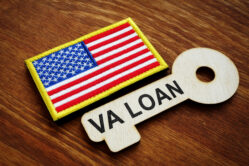Eligible Veterans and service members can use a Department of Veterans Affairs mortgage to finance 100% of the purchase price of a qualified property.
They can also finance the VA Funding Fee as part of the loan.
This means Veterans can purchase a home with no down payment, which is a unique benefit of VA mortgages.
However, to qualify for a VA home loan, the property must meet the VA’s minimum property requirements. The vast majority of properties will qualify, but there are a few exceptions.
VA Loan Eligible Property Types

The most important thing to remember when purchasing a home with a VA loan is that VA mortgages are intended to help eligible Veterans purchase their primary residences.
Additionally, all homes financed with a VA home loan must meet the minimum property requirements (MPRs) set by the VA.
With that in mind, let’s take a look at some eligible property types for VA home loans.
| Property Type | VA Loan Eligible? |
| Single Family Homes | Yes |
| Multi-Family Homes/Duplexes | Yes |
| Condos | Yes |
| Manufactured Home | Yes |
| Barndominiums | Yes |
| Shouse | Yes |
| Tiny Home | Yes |
| New Construction | Yes, but may be hard to find a lender |
| Newly Built Homes | Yes |
| Land | Yes, but must build on the land immediately |
| Investment Properties | No |
VA Loans for Investment Properties
While VA financing is available for multifamily homes, VA loans may not be used on solely an investment property. This means the Veteran must occupy one of the units as their primary residence.
VA Land Loans
VA loans for land alone are not permitted and cannot be used to purchase vacant land. However, you may be able to find a lender willing to finance an undeveloped piece of land as long as the Veteran plans to start construction on the property immediately.
In order to do this, you’d need to use a VA construction loan.
VA Construction Loans
While VA construction loans exist, you may have difficulty finding a VA lender willing to finance it. Construction loans, generally speaking, are a risky investment for lenders as there is no property to run through the MPR checklist.
VA lenders will also want to see an appraisal of the property before closing on the loan to ensure they’re not over-lending. At the end of the day, VA lenders want to ensure the homes they’re financing are safe, sanitary and structurally sound for Veterans, and construction loans make that difficult.
New Construction Homes and VA Loans
A house completed less than one year ago and has never been occupied is considered new construction.
To close on a VA loan, the home must be 100% complete, except for customer-preference items, such as appliances, countertops and flooring.
A newly constructed home is eligible for a VA loan if it meets one of the following criteria:
- The home is covered by a one-year VA builder’s warranty
- The home is enrolled in a U.S. Department of Housing and Urban Development-accepted 10-year insured protection plan
- The Veteran acted as the general contractor in the construction of the home and will be living in the home
VA Approved Condos
The Department of Veterans Affairs must approve a condominium development before a VA loan can be used to purchase one of the units.
The VA maintains a list of approved condo complexes. If you do not find your condo complex on the list, you’ll need to work with a VA-approved lender, and the development will need to go through the VA approval process.
This includes reviewing the complex’s organizational documents and bylaws, homeowner’s association policies, budget and finances, parking availability and more.
VA Loans for Manufactured and Mobile Homes
Manufactured homes are eligible for VA loans as long as they are attached to a permanent foundation and are taxed as real estate. Any manufactured home taxed as a motor vehicle or similar classification would make it ineligible for VA financing.
It’s important to note that manufactured and mobile homes are considered distinct property types when it comes to mortgage lending. The primary difference is that manufactured homes are intended to remain stationary, whereas mobile homes have the capacity for relocation. Because of this, a VA loan cannot be used to purchase a mobile home.
Acquiring a VA loan for a manufactured home can prove challenging, as lenders may be hesitant to provide financing. Manufactured homes tend not to appreciate as much in value and have a shorter lifespan than modular homes and other traditional home types.
However, some VA lenders, including Veterans United, do offer loans on manufactured homes under certain circumstances.
VA Loans for Modular Homes or Prefabricated Homes
Modular homes are built off-site and are then disassembled, transferred to the home location and rebuilt on-site. This is often a more efficient and economical way to build a home. Modular homes tend to be sturdier than mobile homes and often appreciate more over time. Modular and prefabricated homes are eligible for VA loans, and it is easier to find a lender that will back a home loan on a prefabricated house as opposed to a manufactured home.
Like manufactured homes, modular homes must have a permanent foundation and must meet HUD guidelines.
VA Loans for Barndominiums and Shouses
Financing a barndominium or shouse with a VA loan is perfectly acceptable as long as it meets all the minimum property requirements set by the VA. With barndominiums and shouses in particular, you’ll need to make sure there is enough square footage for basic living needs, proper heating and cooling and a roof that is built to last.
A barndomium or a shouse can be a great option for Veterans looking to purchase or build a home with significant square footage but a more affordable price than a traditional home.
VA Loan Minimum Property Requirements (MPRs)
The VA requires a prospective homebuyer to obtain a VA appraisal before they agree to guarantee the home loan.
VA appraisals protect the buyer, the lender and the VA.
For the most part, VA minimum property requirements are common sense. But there are some specific requirements regarding property value and safety that set VA-approved properties apart.
Minimum property requirements for VA loans include things like property accessibility, space requirements and proper function of mechanical systems.
9 Types of Ineligible VA Properties
If any of the following conditions apply, a property is ineligible for VA financing:
1. Doesn’t Meet MPRs and Cannot be Made to Comply
In most cases, this refers to matters of safety and livability, not cosmetic issues. There may also be times when the property either has or lacks features that make it inconsistent with the general market area, such as excessive commercial use.
2. Located in a Flood Hazard Area Where Flood Insurance is Unavailable
Regular homeowner’s insurance policies don’t insure against flooding. If you can’t get flood insurance and your home is destroyed in a flood, you will have no financial recourse.
3. Located in the Coastal Barrier Resource System
These are ecologically sensitive areas that are ineligible for federal expenditures and financial assistance. Since the VA is a federal agency, it cannot lend in those areas.
4. Located in a High Noise Area
Severe noise, such as sound coming from an airport, could impair the property’s marketability since very few people are willing to purchase such a home.
5. Located in Unapproved Condominium Developments
This limitation applies to virtually all types of mortgages. A condominium project is thoroughly analyzed and can be disqualified for issues such as too many non-owner occupied units, an insufficient budget or significant uncompleted common elements, among others.
6. Co-operatives
Condominiums and co-operatives are often used interchangeably, but they’re very different. With a condominium, you own the interior of the unit. With a co-op, you only own a share of the company that owns the entire building. That means that, legally, you don’t own real estate. For that reason, many lenders, including the VA, shy away from co-operatives.
7. Unimproved Land
As mentioned above, you cannot use a VA loan for the purchase of land unless you also plan to immediately build a home on the property. The most common situation in which a Veteran uses a VA loan to buy land is when it is used in conjunction with a new-construction VA loan.
8. Investment Properties or Vacation homes
VA loans are for use as a personal primary residence. Again, you cannot use a VA loan to purchase an investment property purchase. So you can’t use the VA loan to buy a home to rent out to someone else. You also cannot use it to buy a vacation home, summer home, beach house, lake house or second home.
9. Farmsteads
This all comes down to intent. Many farmsteads have a home on the land. If you intend to live there, you can use the VA loan to buy a working farm. You cannot use a VA loan to buy a farm you only plan to use it for the land value.
Get a Home Inspection With a VA Loan
Despite VA property requirements and the fact that the home will be looked over by an appraiser, it’s recommended that a home inspection be performed on the property.
A home inspection can cost anywhere from $200 to $500, but it’s money well spent. After you close on the home and move in, any problems with the property will be your responsibility.
At a minimum, a home inspection represents a second pair of eyes. The appraiser will list anything that may be an obvious problem. But a home inspector does a much closer inspection. Not only will they identify current and potential problems, but they will also gauge the necessity of making those repairs and even the costs.
The VA doesn’t require a home inspection, but getting one is a good way to protect yourself, your family and your investment in the home.

Equal Housing Opportunity. The Department of Veterans Affairs affirmatively administers the VA Home Loan Program by assuring that all Veterans are given an equal opportunity to buy homes with VA assistance. Federal law requires all VA Home Loan Program participants – builders, brokers, and lenders offering housing for sale with VA financing – must comply with Fair Housing Laws and may not discriminate based on the race, color, religion, sex, handicap, familial status, or national origin of the Veteran.




Comments:
About the comments on this site:
These responses are not provided or commissioned by the bank advertiser. Responses have not been reviewed, approved or otherwise endorsed by the bank advertiser. It is not the bank advertiser’s responsibility to ensure all posts and/or questions are answered.
rose steele says
can a veteran use his VA benefits to purchase a church?
Ryan Guina says
Hello Rose, the VA Loan benefit can only be used to purchase a primary residence. Best wishes!
Peter Powell says
Is there a problem in a purchase if the house is less than half the value of the land, barn and other outbuildings on a non-working farm property
Keith Fenton says
I am trying to buy a property that was a church rectory. I was pre-approved, got the home inspection and the appraisal done and now my lender is telling me I can’t use the VA loan for this property because it was a church. Now I am out almost 1,200 bucks. Is there anyway around this? The house is zoned as single family and has been since it was built in 1961.
[email protected] says
The requirements only seem fair given that buying a home is one of the biggest investments one can make and you want to be sure that everything is perfect.
stellagrace says
Very nice blog!Thanks for sharing…Personal loans without credit check can be a better choice than financing with credit cards.Personal loans without credit check have become a wildly popular form of loan.